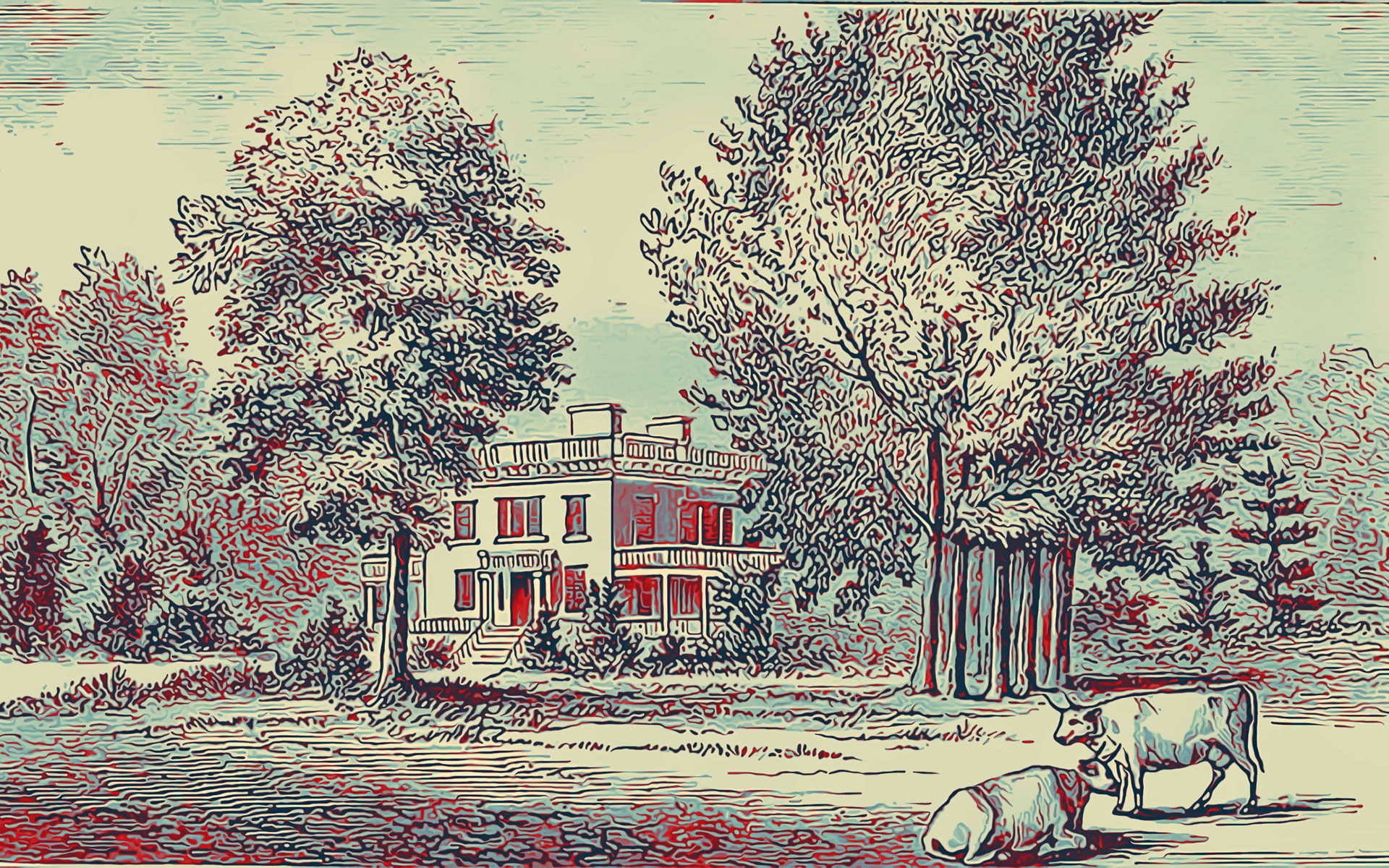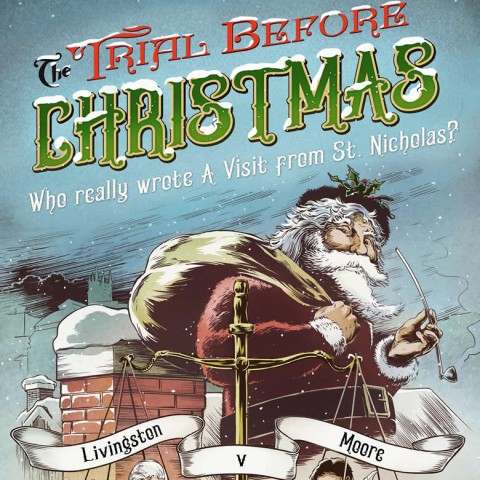Hamilton on the Eve of the Duel

On Saturday, July 7, 1804, General Alexander Hamilton and his wife Eliza hosted a lavish gathering at their new home, the Grange. They invited 70 notables to dine al fresco and amble on pathways behind their mansion. Musicians were hired and placed outside to fill the woods with music.
This was not only a housewarming party, it was a social statement. Hamilton had just helped vanquish Aaron Burr in the 1804 gubernatorial election by 16 points, which ended any hope Burr had of ever rising in politics again. Burr had secretly joined with a Federalist faction that plotted to secede from the union to form a Northern Confederacy, so by heading off this disaster, Hamilton emerged again as the Federalist leader. With his political star on the rise, many of his party guests wanted to be part of Hamilton’s inner circle. Eerie to contemplate in hindsight, the Hamilton-Burr duel had been scheduled weeks before Hamilton welcomed New York society to his “garden party.”
When Hamilton left his gracious estate that Monday morning July 9, he would never return. He would never again see his showpiece home, his gardens and orchards, his thirty-five acres of woodland, or his enviable view of the three rivers—the Hudson, the Harlem and the East Rivers–that encircled Manhattan Island.
Hamilton kept a townhouse at 54 Cedar Street in lower Manhattan, and that is where he spent July 10, the last night before the duel. One can imagine this high-strung genius, restless throughout the night as he steeled himself to meet Aaron Burr in the morning much as he had as a young soldier when facing battle during the Revolution.
* * *
A week before, Hamilton wrote a letter to Eliza after encountering Burr at the annual Fourth of July Cincinnatus Society party:
“This letter, my very dear Eliza, will not be delivered to you, unless I shall first have terminated my earthly career; to begin, as I humbly hope from redeeming grace and divine mercy, a happy immortality.
If it had been possible for me to have avoided the interview, my love for you and my precious children would have been alone a decisive motive. But it was not possible, without sacrifices which would have rendered me unworthy of your esteem. I need not tell you of the pangs I feel, from the idea of quitting you and exposing you to the anguish which I know you would feel. Nor could I dwell on the topic lest it should unman me.
The consolations of Religion, my beloved, can alone support you; and these you have a right to enjoy. Fly to the bosom of your God and be comforted. With my last idea I shall cherish the sweet hope of meeting you in a better world.
Adieu best of wives and best of Women. Embrace all my darling Children for me.
Ever yours
A H
July 4. 1804
Shortly afterward, Hamilton prepared an inventory of his assets and debts. Even overestimating his assets and underestimating his debts, he was in debt, largely due to years of under-billing clients and most recently to build his lavish home. In the event of his death he would leave his large family of eight destitute, unable even to remain in their new home.
Thus Hamilton clearly saw the possible consequence of the duel, the pain and confusion it would cause his wife and children. Worse than that, in the will he drafted two days before the duel, he asked his children to pay off any of his remaining debts. His brother-in-law John Barker Church, from whom he borrowed the pistols, witnessed the will which reads:
New York, July 9, 1804
In the Name of God Amen! I Alexander Hamilton of the City of New York Counsellor at Law do make this my last Will and Testament as follows. First I appoint John B Church Nicholas Fish and Nathaniel Pendleton of the City aforesaid Esquires to be Executors and Trustees of this my Will and I devise to them their heirs and Assigns, as joint Tenants and not as Tenants in common, All my Estate real and personal whatsoever and wheresoever upon Trust at their discretion to sell and dispose of the same, at such time and times in such manner and upon such terms as they the Survivors and Survivor shall think fit and out of the proceeds to pay all the Debts which I shall owe at the time of my decease, in whole, if the fund shall be sufficient, proportionally, if it shall be insufficient, and the residue, if any there shall be to pay and deliver to my excellent and dear Wife Elizabeth Hamilton.
Though if it shall please God to spare my life I may look for a considerable surplus out of my present property—Yet if He should speedily call me to the eternal world, a forced sale as is usual may possibly render it insufficient to satisfy my Debts. I pray God that something may remain for the maintenance and education of my dear Wife and Children. But should it on the contrary happen that there is not enough for the payment of my Debts, I entreat my Dear Children, if they or any of them shall ever be able, to make up the Deficiency. I without hesitation commit to their delicacy a wish which is dictated by my own. Though conscious that I have too far sacrificed the interests of my family to public avocations & on this account have the less claim to burthen my Children, yet I trust in their magnanimity to appreciate as they ought this my request. In so unfavourable an event of things, the support of their dear Mother with the most respectful and tender attention is a duty all the sacredness of which they will feel. Probably her own patrimonial resources will preserve her from Indigence. But in all situations they are charged to bear in mind that she has been to them the most devoted and best of mothers. In Testimony whereof I have hereunto subscribed my hand the Ninth day of July in the year of our lord One thousand Eight hundred & four.
Signed sealed published & declared as and for his last Will and Testament in our presence who have subscribed the same in his
presence. } Alexander Hamilton
The words John B Church being above interlined.
Dominick T Blake
Graham Newell
Theo B Valleau
Despite the prior farewell letter to be opened if he died and having made his will, something else troubled him. Pondering his possible death, he wrote another letter to Eliza to try to explain his decision to throw away his shot:
The Scruples of a Christian have determined me to expose my own life to any extent rather than subject myself to the guilt of taking the life of another. This must increase my hazards & redoubles my pangs for you. But you had rather I should die innocent than live guilty. Heaven can preserve me and I humbly hope will but in the contrary event, I charge you to remember that you are a Christian. God’s Will be done. The will of a merciful God must be good.
Once more Adieu My Darling darling Wife
A H
Tuesday Evening 10 o’Clock
Mrs Hamilton
Having set his affairs in order, Hamilton slept a few hours. All too soon it was time to rise and dress and walk to the river to be rowed over to New Jersey, and to meet a loaded pistol in the hands of Aaron Burr.


